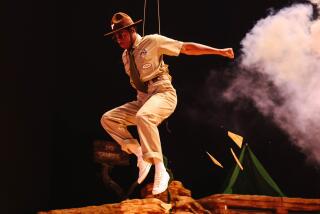Freelon Delivers Her Usual Grace
Nnenna Freelon was the embodiment of grace Friday on the opening show of her two-night run in Costa Mesa. Her sophisticated tone and delivery coupled with a smooth stage presence and a tastefully selected program made for an elegant, satisfying performance at the Orange County Performing Arts Center’s Jazz Club series in Founders Hall.
It was no surprise to those who have followed Freelon’s career. Since her emergence on the Columbia record label earlier this decade and her subsequent recordings for the Concord label--the latest a dozen-tune collection of songs written or co-written by women--the Durham, N.C., resident has been frequently tabbed as the heir to the great tradition of Sarah Vaughn, Billie Holiday and Ella Fitzgerald. Although that designation carries a certain weight and responsibility, Freelon handles it with elan.
Working in warm, confident tones, she opened the performance with Nona Hendryx’s “Come Into My Life,” a saucy invitation into which she sprinkled snippets of “Fly Me to the Moon,” “The Look of Love” and other appropriately meaningful titles.
From there, she mixed it up with “Falling in Love,” Blossom Dearie’s “Inside a Silent Tear,” “Close Your Eyes,” Herbie Hancock’s “Maiden Voyage (with a lyric penned by Hancock’s sister, Jean Hancock) and a medley of “I Can Sing a Rainbow” from the 1955 movie “Pete Kelly’s Blues” and the Dorothy Fields-Jerome Kern song “Pick Yourself Up.”
She acknowledged the season with a jazz-twisted version of “Santa Claus Is Coming to Town” and an encore of Mel Torme’s “Christmas Song.”
Although not all these tunes may have been familiar, Freelon made them feel as if they were. Her voice, with its similarities to Vaughn’s, was full of depth and a grainy richness. Her assured phrasing often fell far behind the beat, keeping listeners hooked as they waited for the next word to drop. She used a wide, dynamic range to great effect, sounding surprisingly strong even when she sang at a whisper.
Her grace extended to her posture, stately and erect one moment, in motion the next as she swiveled at the hips or shoulders, her hands tracing patterns as she moved. She shied away from the usual “be” and “bop” scat syllables, instead constructing beautiful, wordless vocals from soft, round vowel combinations.
Freelon invited comparisons to the late Betty Carter in the way that she allowed her band to serve as more than just a shadow cast behind her. Pianist Xavier Davis was especially responsive to the singer, while providing direct, no-nonsense soloing of his own.
London-based bassist Wayne Batchelor kept to the lower end of his instrument’s range even when soloing, providing firm, solid footing for the music. Drummer Will Terrell, a veteran of Davis’ combo, played with marvelous shading and understatement.
On occasion, Freelon seemed to start slightly off pitch, especially when beginning a phrase, but even these brief, infrequent missteps arrived with warmth and a refreshing sincerity. Though the center’s Jazz Club series leans heavily on vocalists this season, it’s doubtful that any one of them will be as good as Nnenna Freelon.
More to Read
The biggest entertainment stories
Get our big stories about Hollywood, film, television, music, arts, culture and more right in your inbox as soon as they publish.
You may occasionally receive promotional content from the Los Angeles Times.










